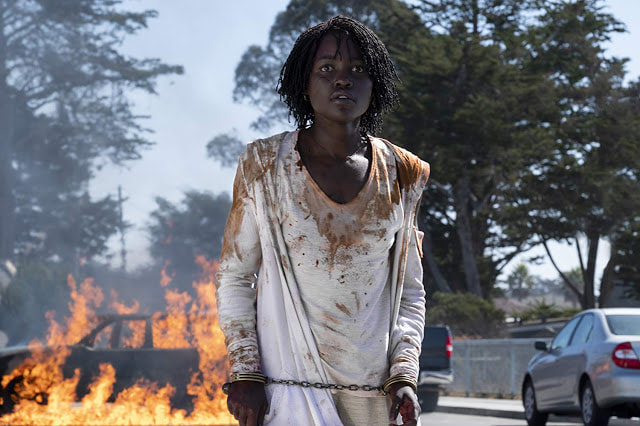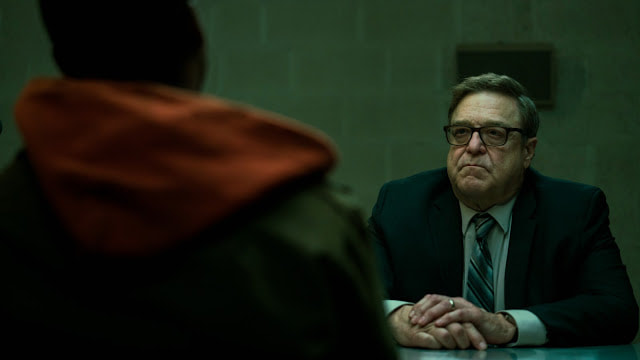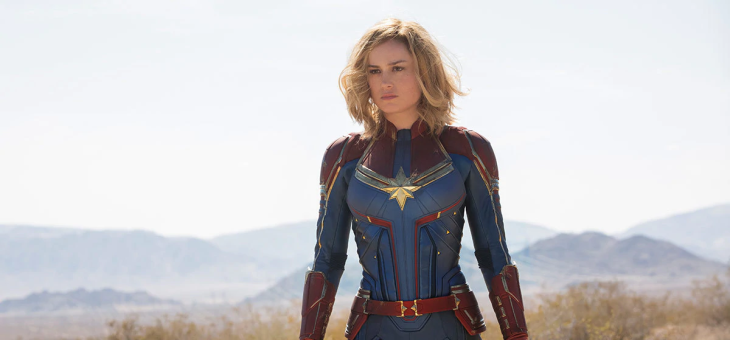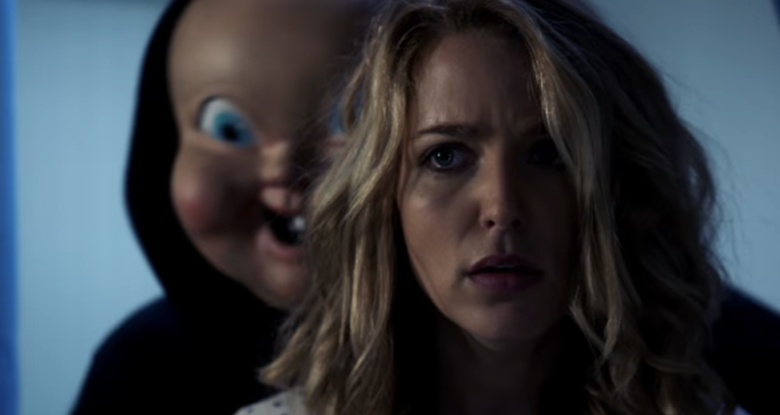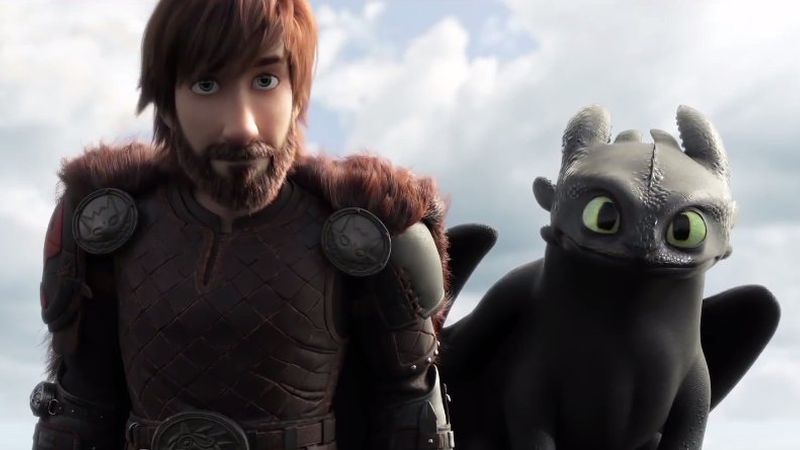|
by Philip Price Director: Jordan Peele Starring: Lupita Nyong'o, Winston Duke & Elisabeth Moss Rated: R Runtime: 1 hour & 56 minutes “Therefore, thus saith the Lord, Behold, I will bring evil upon them, which they shall not be able to escape; and though they shall cry unto me, I will not hearken unto them.” And so, goes the Bible verse Jeremiah 11:11 from the Old Testament which serves to add incredible weight to the context of Jordan Peele’s sophomore effort and follow-up to his Oscar-winning feature debut, “Get Out.” Specifically, this passage represents a key mind set for half of the characters in “Us” but given the countless interpretations each verse of the Bible inspires so does what this verse might mean to our cast of characters. Peele utilizes both a handful of horror movie tropes as well as some admittedly fantastic symbolism to reiterate the influence of this verse on his work time and time again throughout the film seemingly forcing the audience to determine just how much they might mean to take or receive from film, what these images and actions might mean, what they might be saying, what they're trying to say, or if they even intend to say anything at all. In the context of the Bible, this verse refers to God's punishment of the Jews after the fall of Babylon. God was punishing Jeremiah and his fellow Jews for worshiping false idols, but in “Us,” the descending attackers who are also doppelgängers of the characters that make-up our main family seem to be mad at their counterparts for a handful of other reasons. Of course, there is no doubt the argument could be made that in some regard the family under attack in “Us” are false versions of these invading doppelgängers thus the reason the red jumpsuit-laden clones are so intent on doing away with their counterparts, but it can't help but feel as if there should be more to Peele's second film than simply this tit for tat comparison between the verse he quotes and the story he is telling. Moreover, it doesn't just feel as if there should be, but it feels as if there is more at work here than just a metaphor for this kind of darkness that lurks inside us all; this ugliness we all have to come to terms with at some point in order to move on and either choose to better ourselves or succumb to our repressions. Of course, the seemingly numerous analogies and motifs littered throughout “Us” could simply exist to suggest the inspiration of different ideas and considerations in individual viewers while the core of what Peele is doing is executing his love of horror on a much grander if not more stimulating scale.
“Us” begins by introducing us to a young Adelaide Wilson (Lupita Nyong'o) in Santa Cruz in 1984 as she attends a fair on the boardwalk with her father, Russel (Yahya Abdul-Mateen II), and mother, Rayne (Anna Diop), as her father is very clearly already inebriated though still manages to convey a visible sense of affection for his daughter while Rayne is beyond irritated he can't seem to either hold his liquor or resist drinking on a family outing. This irritation only intensifies when Adelaide's mother asks her father to watch the young girl while she goes to the restroom and in that short period of time Russel loses her. Adelaide has wandered off into a house of mirrors and naturally-within this environment-happens to see herself many times one of which just so happens to not be a reflection. In what could only be described as a twin or clone of some kind Peele quickly takes us out of the scenario and fast forwards to the present day, but we are left with this looming sense of dread that these events also left a lasting impression on Adelaide. In this present day scenario, grown-up Adelaide is happily married to Gabe (Winston Duke) and has two children, a boy named Jason (Evan Alex) and a girl named Zora (Shahadi Wright Joseph), with Zora being the oldest and presently in full-on teenager mood while the younger Jason feels socially awkward and unsure of himself. Adelaide is seemingly happy and content as this representative of your average, middle-class family are headed toward, not coincidentally, Santa Cruz where they are staying in the same house near the beach that Adelaide grew up in while planning to get in some good hang time with a couple of friends who have rented a place down the street. It's evident from the get-go that Gabe measures himself against Josh (Tim Heidecker) and Kitty (Elisabeth Moss) if not his children against their spoiled, condescending teenage twins (Cali and Noelle Sheldon), so much so that Gabe goes to the extent of buying a boat without his wife's knowledge simply so that he might impress Josh or at least prove he's as capable and successful as his friend. It's not long after meeting the Wilson family that they retire to their house and, as you've no doubt seen in the trailers, their doppelgängers show up with little to no explanation as to why they exist, what they want, or what their intentions are with this family that looks exactly like them. To go any further into plot details would certainly tend to begin spoiling certain elements, but while there will be slight spoilers throughout the rest of the review, what is interesting about “Us” at this stage in the discussion is how it tends to evolve from a contained study of family dynamics, social classes, and personality responses to mainstream culture mixed with a home invasion thriller to that of operating on a scope that is much grander than expected. By the time the second hour of the film kicks in the viewer bears witness to the fact this isn't just an isolated incident and that in fact what is happening to the Wilson's is something of a worldwide event-brought down to our level in a shockingly blunt and violent sequence. While Peele makes his audience aware of this scope though, this doesn't mean we necessarily see the repercussions of such events on the same scale as we, the viewers, stay in tow with the Wilson family and are led to believe they might be key to why these events are happening in the first place. That said, there is a plot twist in the third act, but it ultimately feels like a twist for the sake of having a twist in a horror movie. The twist certainly makes sense in the scheme of the story and undoubtedly enhances the meaning that Peele knows audiences are going to pull from his film, but it is an obvious twist that several other movies have utilized in order to serve as something "shocking". Peele doesn't rely on this to the point it's not effective as it's easy to see how said twist will make repeat viewings feel more layered, but upon first viewing it leaves the audience feeling as if the final, "big twist" was more of a cop out than a well thought out revelation given the type of analysis that has taken place throughout. With “Get Out,” Peele essentially crafted a masterpiece in every aspect of filmmaking; from the writing to the performances to the meaning to the craft in general. As much is stated due to the fact it will always be somewhat unfair that Peele set this precedent for himself right off the bat, but it is now a fact of the matter and the fact is all of his films that follow forth from here on out will inevitably be compared to that debut. As previously mentioned though, “Us” is its own kind of interesting by virtue of the fact it broadens its scope as it unfolds which is immediately different from the more contained, air-tight narrative of “Get Out” that was broadened more in terms of theme than in actual scope or visual prowess. “Us” is Peele operating on a new level; a level that should be taken as his vision unfiltered. This is exciting, obviously, and everything Peele does here on a surface level, in regard to “Us” functioning strictly as a genre film is telling as it is genuinely scary in a world where genre films can easily rely on tropes or well-worn styles to get them through the necessary beats. With “Us,” viewers will naturally draw conclusions about the metaphors and the meanings of these metaphors, but Peele has done maybe the best thing he could have done in having first and foremost made an entertainingly scary (and scarily entertaining) movie. The doppelgängers are legitimately frightening and make no doubt that Nyong'o's dual performance here doesn't have everything to do with this effectiveness. The woman turns in two lead performances that are equally distinct and drastically different from one another. The tone that Peele balances (or tries to balance, but more often than not succeeds in) between real horror and comedic undertones is surprising and only rarely undercuts itself. As in “Get Out,” there was a heavy reliance on comedy as certain character's functioned only to serve as comic relief and while there are hints of as much within “Us” this is a much darker film in terms of where it goes and how far it's willing to go. Duke's Gabe is the best example of this, but Gabe is not a character that exists only to serve this function. Rather, Gabe is a fully fleshed-out character with a real arc, a definite purpose, and a key member of the ensemble who just so happens to be funny in moments even if not all of those moments are opportune. It's a hard balance to maintain period never mind for a full two-hours, but there are instances where the great tension the film has earned is deflated due to this need for a laugh that inadvertently stalls the momentum no matter how slight. The strong performances extend across the board and into the hands of the child actors that are given more to do than initially expected especially given the tone and genre type. Though they tend to be mostly one dimensional save for a few moments once shit really hits the fan the performances by Joseph and Alex add aspects and features to characters, we think we have figured out within the first five minutes of being introduced to them. Furthermore, the scares are authentic when the tone does begin to swing for the fences of being a straight-up nasty, bloody horror movie with some pretty gnarly moments along with employing the kind of tension that gives one the sense of knowing they don't want to know what's about to happen despite the fact they can't help but continue to watch to find out what occurs because an investment has been made in these characters. Beyond what they might each represent we are simply rooting for this family to make it out of whatever weird situation this actually is; even if what is happening and how it is happening is never really made clear. The score from Michael Abels is also of note as it immensely enhances the scares and level of tension that reside within the experience. Not to play devil's advocate necessarily, but the hang-up with “Us” is that there is seemingly so much going on within the mind of the movie that it leaves things vague to the point any certain interpretation could be taken with a fair amount of credibility. While there is certainly nothing wrong with leaving strands open for interpretation or in littering details throughout one's narrative to eventually culminate in something that can be interpreted in any number of ways what is frustrating about “Us” is that it doesn't provide answers to some of the more basic plot points that would essentially nail down whether Peele wants viewers to at least lean in one direction or the other. Instead, “Us” feels as if it doesn't necessarily care what direction it leans toward as long as you, the audience member, take away a direction you can run with it in. While “Get Out” was explicitly about race, “Us” more allows its audience to derive their own meaning from it. There are certainly theories that could be applied to “Us” that deal in race relations, in immigration, in border control, and limitations placed on people because they're not like the person a fair amount of "U.S." (get it?) citizens see in the mirror, but the film could also go a completely different way in being this portrait of duality-this analysis of our society turning in on itself with aspects like the aforementioned twins, the house of mirrors, and the weapon of choice in this film (the scissors) all representing two separate things that share a likeness that are bound together in some fashion. The "tethered" as they are often referred in the film are shadows of these more privileged counterparts, they seek to bring down with the opening bible verse being a pretty bold statement about things that mirror one another. The key in this line of thinking though, seems to be that of the tethered suffering through their lives at the mercy of the actions and decisions made by their above ground counterparts. The tethered are seemingly human beings on a base level but are treated as less than. They are the same as those we see flourishing in what is the movie's version of our reality, but without the same opportunity and in many ways represent the countless possibilities of the many versions a single person can become based on their upbringing and the amount or lack of love invested in them. There are a million other theories that could undoubtedly be taken from even these ideas that could likely be fully supported by details others could point out and the fact “Us” provides so much to chew on says a lot about the film in general, but it's something of a double-edged sword for as it could seemingly be about any number of things it isn't definitively about anything and therefore feels as if the film itself isn't sure what it wants to say. I'm sure Peele has a very specific idea and clear intent behind his writing and this story, but as far as how this is relayed to the average, non-objective movie-goer taking this at face value, “Us” ultimately ends up feeling light in its persuasion to help one see something familiar in a different light. It's one of those things where there is so much happening that it becomes more difficult to receive what was meant to be taken away. Again, with the precedent “Get Out” set it is understood there is a yearning to gain a new perspective from Peele's work even if it's not there and while it's unfair to maybe expect this from a creator on a consistent basis if Peele is going to lean into this reputation as he does with this sophomore effort it would be more fulfilling if everything he sets up had been followed through on in a more decisive manner.
0 Comments
by Philip Price Director: Rupert Wyatt Starring: John Goodman, Ashton Sanders & Jonathan Majors Rated: PG-13 Runtime: 1 hour & 49 minutes Rupert Wyatt passed on making a sequel, never mind a complete trilogy of ‘Planet of the Apes’ movies which then gave writer/director Matt Reeves (“Cloverfield”) an in to complete the trilogy and go on to now be penning and planning a solo Batman film for WB's DCEU. Would Wyatt have preferred this career path? Who's to say? And who's to say if Wyatt had rounded out the ‘Apes’ films that he would have been offered the Batman film at all, but it does stand to question if Wyatt regrets his decision to pass on such high profile opportunities. Since deciding not to return to the world of stories about simians though, Wyatt has only made one feature (2014's re-make of “The Gambler” for Paramount which held a $25 million production budget and only turned over a $39 million worldwide gross) with “Captive State” being his second outing into feature-length material and a seemingly personal one at that. Wyatt co-wrote the screenplay for “Captive State” with Erica Beeney (“The Battle of Shaker Heights”) and serves as a producer, but this low-budget drama/thriller has more in common with Wyatt's 2008 breakout, “The Escapist,” than it does his 2011 introduction to the mainstream despite posing as a tale that typically functions on the same scale or budget as a ‘Planet of the Apes’ sequel.
This is all said because I like Wyatt as a filmmaker. I think the guy has a knack for striking the right, more intriguing chords in what otherwise might be considered mundane material and yet-with his own script-he fails to bring enough of his own voice to a genre that has been worn thin. Looking like Neill Blomkamp, but feeling more in the vein of Steven Spielberg's “War of the Worlds,” “Captive State” is a post-alien invasion movie that sports a fair amount of interesting imagery in its surprisingly effective handheld approach, a tight script whose final 10-to-15 minutes proves this thing had its head screwed on tight the whole time, and a score from Rob Simonsen that stands the all-important test of remaining engaging apart from the images it was meant to be paired with. On the other hand though, “Captive State” is also juggling a handful of disparate parts making it not nearly as interesting as all of these elements would purport it to be. There is a serious lack of investment in anything going on and there is a lot going on; there is simply no forward momentum within the narrative or within any of the characters as much of the races in which these characters are running feel familiar without ever adding much to the conversation. John Goodman, Ashton Sanders and Jonathan Majors are each given the most to work with here, but Wyatt almost regrettably fills his cast with a great roster of character actors-including Alan Ruck, James Ransone and Kevin Dunn as well as Madeline Brewer and Machine Gun Kelly in bit parts-but gives them little to nothing to do. The most shameful offense to the under-utilized players here though is that of Vera Farmiga who ultimately comes to play a key role yet only appears in maybe five total minutes of the movie. What is largely Goodman and Sanders' movie means the two make well with that they're given and by virtue of their presence some level of engagement is earned, but while it's clear the film as a whole is a very meticulously plotted and deliberately paced piece none of these elements reach the heights of providing the audience anything to genuinely be engaged with or entertained by. At the very least, with this being a science-fiction tale of sorts, there was some expectation for a strong allegory and while there's definitely some subtext to the going-ons here it is too broad to really hit any kind of nail in a cutting or insightful manner. In the battle between order and chaos, there is a rare balance struck in Wyatt's “Captive State” that unfortunately leaves room for very little excitement. by Philip Price Director: Anna Boden & Ryan Fleck Starring: Brie Larson, Samuel L. Jackson & Jude Law Rated: PG-13 Runtime: 2 hours & 4 minutes “Captain Marvel,” notable for being the first female-led Marvel Cinematic Universe film after 21 movies, is a fun and sometimes unique take on the super hero origin story that unfortunately never finds its groove enough to the point it's somewhat fearful the character won’t be able to get her groove back when it comes time for “Avengers: Endgame.”
For all intents and purposes, Anna Boden and Ryan Fleck’s MCU debut is your boilerplate Marvel origins story which, by virtue of where we’re now at in this universe, makes it feel small in comparison to even the most recent additions. Falling somewhere in between the muddled middle of “Doctor Strange” and “Black Panther,” Brie Larson's Carol Danvers isn't a riff on an origin story we've seen before, but neither does it have the added elements of magic as in ‘Strange’ or the advantage of introducing us to a new world a la ‘Panther.’ In a Phase Three world, a mostly Earth-set origin story was going to have to give us a little something more than also doubling as the origin story for Samuel L. Jackson's Nick Fury or - at least - it was going to need to find a really cool, really fresh way to convey that story. For example, in the opening 20 or so minutes of “Captain Marvel,” we are treated to what is essentially a “Star Wars” or “Star Trek” like space opera with the full-on introductions of the Kree and Skrull races we've heard whisperings of for years as well as to the Kree home planet and their military force for which Danvers has been trained by her mentor, Yon-Rogg (Jude Law). Such introductions lend the film something of a “Guardians of the Galaxy” vibe, but the tone is different enough that this could simply be yet another facet of the MCU we haven't yet seen. Were Boden and Fleck, who also wrote the script alongside Geneva Robertson-Dworet, to harness the momentum of this initial set-up and action sequence, executing it in the fashion of a genre flick of this type that was released in the decade their film is set, the film might have proven to be a more unique and odd side venture for the MCU, but unlike the flavor Taika Waititi brought to “Thor: Ragnarok” or the subversiveness James Gunn infused his “Guardians of the Galaxy” films with, “Captain Marvel” ends up being a perfectly serviceable, but highly average entry in the ever-expanding MCU; a movie that feels more like the pilot of a ‘90s spin-off series that never hits the same strides as the series that inspired it rather than the explosive debut it could seemingly have so easily been. by Philip Price Director: Christopher Landon Starring: Jessica Rothe, Israel Broussard & Suraj Sharma Rated: PG-13 Runtime: 1 hour & 40 minutes Let's talk about how bold “Happy Death Day 2 U” actually is...
Beginning with the fact that writer/director Christopher Landon (“Scouts Guide to the Zombie Apocalypse,” a personal favorite) doesn't simply repeat the first movie again (pause for sympathy laughs), but rather that he goes on a mission to better contextualize the first film through the journey of this second chapter that shifts itself from a straight-up slasher flick to that of a sci-fi slasher with leveraged moments of humor is an admittedly strange, but courageous place to go. Things could have become muddled just as quickly as they'd been cleared-up by the first movies clean and cheery climax, but Landon somehow manages to entangle his core group of college kids in an even greater mess of time travel by adding in ideas of parallel dimensions and multiple universes. The inclusion of such well-worn comic book and science fiction tropes could have just as easily led to this sequel chasing its own tail and eventually folding in on itself narratively, but instead it is this new facet that breathes new life into the newly-minted franchise as the man in the mask is somewhat pushed to the back. This does decrease in the scares, sure, and the movie doesn't hold as much of a "creepy" factor in terms of putting the audience at unease, but the time constraint element of the plot paired with the still lurking serial killer amps up the tension enough it's easy not to notice the genre shift. It is when we realize that not only is “Happy Death Day 2 U” continuing the time loop story in an interesting and entertaining fashion, but that it's actually building on the events of that first film in a way that makes those events from the first film more meaningful and using this newfound emotional investment in these now familiar characters and settings to ratchet up said investment and expand the ideas being explored that we realize how smart Landon has been about his approach and how rewarding the viewing experience truly is. The test for a movie that shows us the same thing over and over again is whether or not it makes something familiar feel born again - the same way our protagonist feels every time they wake up with another opportunity to live their best life - and like “Happy Death Day,” “Happy Death Day 2 U” finds a multitude of ways in which to make all of this not only feel fresh, but to add layers and meaning where there seemed to be only be a desire for strong wit and entertaining distractions before. by Philip Price Director: Dean DeBlois Starring: Jay Baruchel, America Ferrera & F. Murray Abraham Rated: PG Runtime: 1 hour & 44 minutes It's been nearly a decade since audiences were first introduced to Jay Baruchel's Hiccup and his mythical friend, Toothless, but despite the long stretches of time in between each installment of “How to Train Your Dragon” (four years in between the first and five years in between the second and third) writer/director Dean DeBlois only seems to take this time to hone each new story and the character arcs of each major player all the more. While the story specifics of the previous two installments tend to escape me, what remains is the memory of the impact each film left on me; the first film rousing a sense of respect for being more than it had to be and the second a sense of appreciation for the ambition of the scope and scale in both its storytelling and visual prowess.
With this third and final installment, “How to Train Your Dragon: The Hidden World,” DeBlois beautifully rounds out the story and friendship of Hiccup and Toothless with another familiar set of story beats, but a wholly inventive way of connecting them that doesn't rely on the previous films for investment or emotional resonance, but this of course doesn't hurt it either. As with the whole of the trilogy, there is real risk, real cost, and a real edge associated with these films that one doesn't often see integrated into children's entertainment. This time around - in regard to Hiccup - DeBlois and co. touch on letting go and moving on while noting each of these things is a necessary part of maturing into a compassionate and level-headed leader whereas Toothless makes these same strides through being afforded the opportunity of a new life, he doesn't have to feel guilty about wanting. All well and good, of course, but ‘The Hidden World’ really soars when it puts on display its command of the craft of movie-making and allows the moving pictures to do all the talking. The wordless sequence in which Toothless courts a new "light fury" is both breathtaking and entertaining, for adults and children alike, but more than anything it is simply lovely to experience as it is one of those moments where getting caught up in what is happening on screen isn't a choice; it simply sucks you in and you wait with bated breath hoping that Toothless somehow pulls this off. It didn't take long to realize how quiet the child-filled theater became when the power of this sequence became apparent. What more could one ask for out of a trilogy finale than for it to be both about growth and acceptance while at the same time reminding you what it's like to be a kid again? |
Archives
July 2024
|
